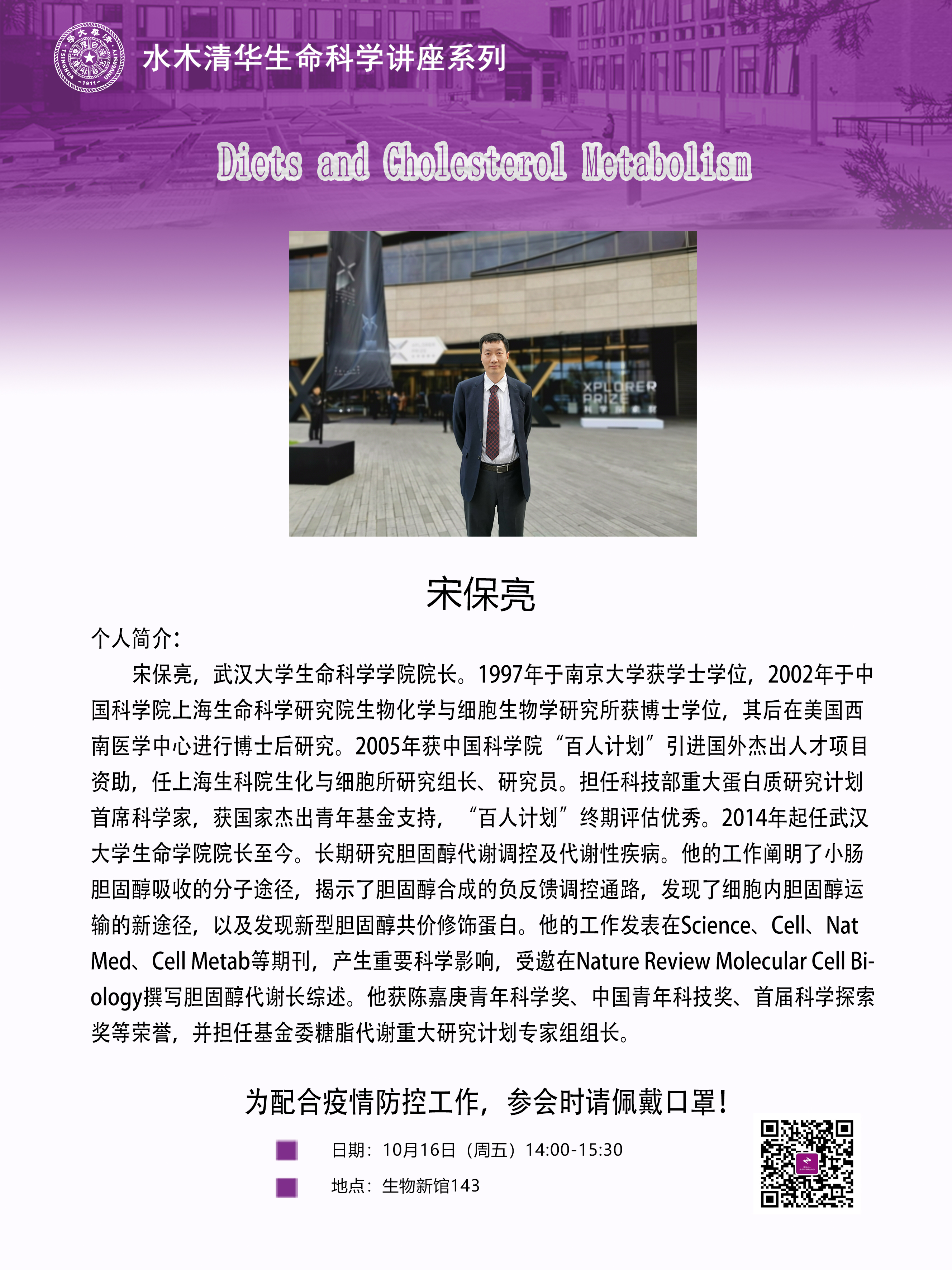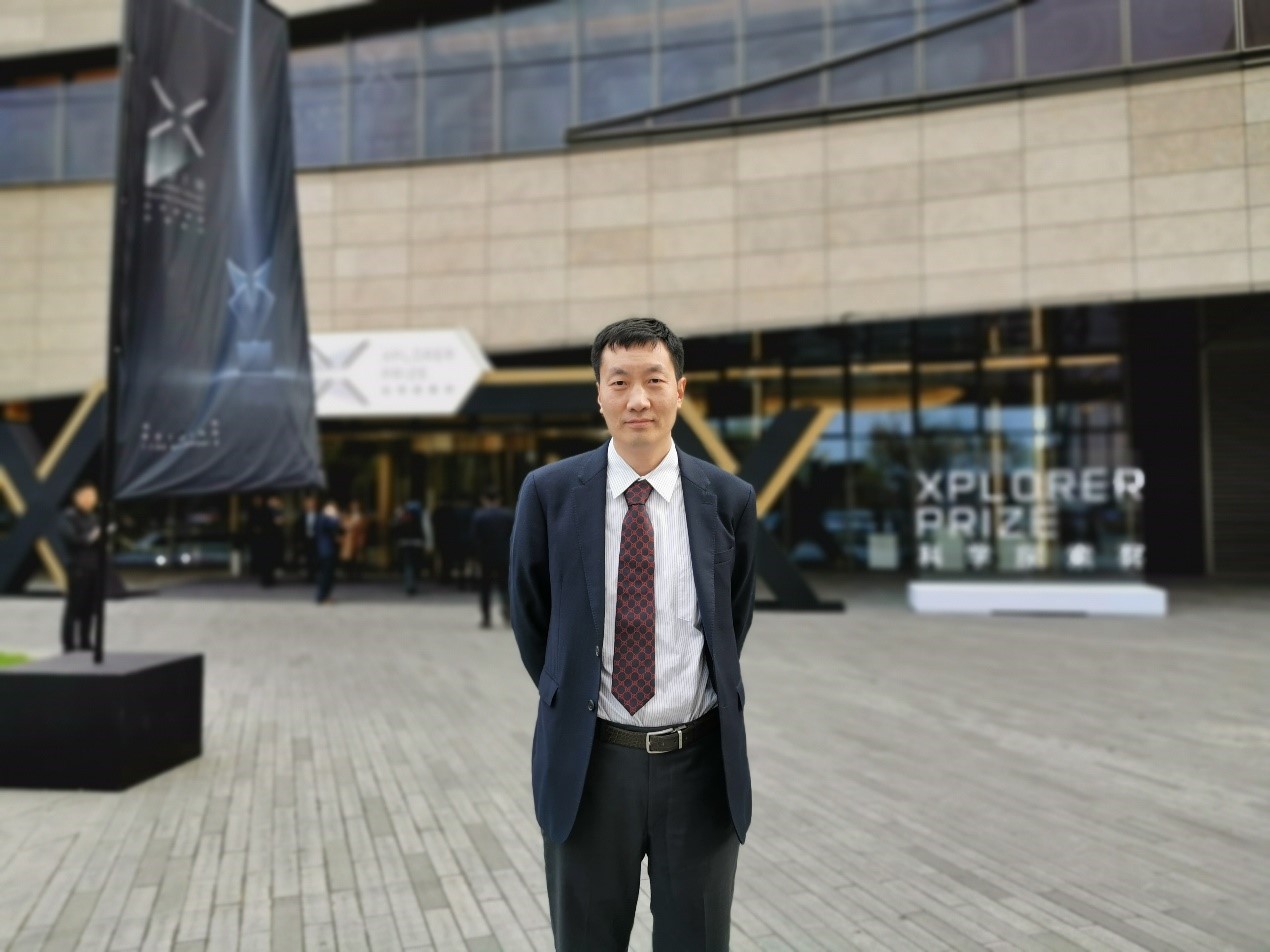10月16日水木清华生命科学讲座系列 - 宋保亮
时间:2020-10-16 14:00-15:30
主讲人:宋保亮
主题:Diets and Cholosterol Metabolism
地点:清华大学生物新馆143

报告题目:Diets and Cholesterol Metabolism
报告摘要:Cholesterol is the most abundant sterol in mammals. It plays multifaceted roles including modulating membrane function, serving as a precursor to bile acids and steroid hormones, and covalently modifying Hedgehog and Smoothened proteins. Excessive cholesterol and other lipids are major risk factors for cardiovascular disease, nonalcoholic fatty liver disease, obesity and diabetes. It is estimated that a human adult needs about 1 g of cholesterol per day, either from de novo biosynthesis or from intestinal absorption. The liver is the major cholesterol biosynthetic organ accounting for about 50% of total production in adult individual. Starting from acetyl-CoA, cholesterol is synthesized through about 30 steps of reactions. Intestinal cholesterol can be taken up into enterocytes through NPC1L1-mediated vesicular endocytosis involving NUMB and LIMA1 proteins. The NPC1L1 forms cholesterol-rich membrane microdomain with Flotillins. Cholesterol binds the extracellular N-terminal domain of NPC1L1, therefore promotes the dissociation of C-terminal endocytic motif of NPC1L1 from plasma membrane. NUMB binds the endocytic sequence of NPC1L1 and mediates the endocytosis of NPC1L1 complex to bring cholesterol into cells. NPC1L1 is transported back to plasma membrane mediated by LIMA1 and Myosin Vb. High level of cholesterol can feedback inhibit cholesterol biosynthesis through promoting the degradation of HMG-CoA reductase, the rate-limiting enzyme in cholesterol biosynthetic pathway. Cholesterol biosynthesis is an energy- and nutrient-consuming process. During the evolution history food supply was never consistent and animals experienced cycles of famine (fasting) and feasting (feeding). It has been known for a long time that cholesterol biosynthesis is repressed at fasting state but increases upon feeding when the dietary cholesterol is not sufficient. I will also discuss our latest finding that how cholesterol synthesis is regulated at the fasting-refeeding transition.
个人介绍:
宋保亮,武汉大学生命科学学院院长。1997年于南京大学获学士学位,2002年于中国科学院上海生命科学研究院生物化学与细胞生物学研究所获博士学位,其后在美国西南医学中心进行博士后研究。2005年获中国科学院“百人计划”引进国外杰出人才项目资助,任上海生科院生化与细胞所研究组长、研究员。担任科技部重大蛋白质研究计划首席科学家,获国家杰出青年基金支持,“百人计划”终期评估优秀。2014年起任武汉大学生命学院院长至今。宋保亮长期研究胆固醇代谢调控及代谢性疾病。他的工作阐明了小肠胆固醇吸收的分子途径,揭示了胆固醇合成的负反馈调控通路,发现了细胞内胆固醇运输的新途径,以及发现新型胆固醇共价修饰蛋白。他的工作发表在Science、Cell、Nat Med、Cell Metab等期刊,产生重要科学影响,受邀在Nature Review Molecular Cell Biology撰写胆固醇代谢长综述。他获陈嘉庚青年科学奖、中国青年科技奖、首届科学探索奖等荣誉,并担任基金委糖脂代谢重大研究计划专家组组长。
个人照片:

